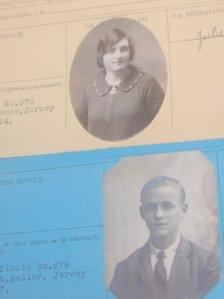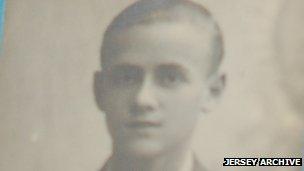New records from 1911 available at Jersey Archive
- Published

Anyone who came to Jersey who was not British had to fill in an alien registration card
A butcher accused of adulterating sausages with acid and the arrests of St Helier prostitutes are just two of the stories featured in newly-released documents from Jersey Archive.
On 1 January, 200 new records were made public.
Archivist Linda Romeril said islanders could use the documents to get a clearer picture of Jersey's history, and maybe find out more about their ancestors.
Many date from 1911, when George V was crowned, British MPs first received salaries and the Suffragettes stormed Parliament.
In Jersey in 1911, 13 coins of buried treasure were unearthed at La Moye and the States debated the Elementary Education Act which proposed extending the school leaving age to 14.
Criminal misdemeanours, admission registers from the General Hospital from 1911 and minutes from the Defence Committee between World War I and II are now available for islanders to see at the Jersey Archive.
Linda Romeril, head of archives and special collections at Jersey Heritage, said the records included witness statements for criminal cases.
Alien's Office
She said one case is of a butcher who got in trouble for "adulterating the pork pies and sausages with boric acid".
She said: "We don't know if he did this on purpose or whether it was an accident.
"It leads people to get pretty sick and if you have too much it can actually poison you."
Ms Romeril said there were also alien registration cards in the records.
She said: "It wasn't little green men, but anyone who came to the island who wasn't British was called an alien, that was the term they used back then.

Joseph Oeillet, a 16-year-old hairdresser, had to fill in an alien registration card in Jersey in 1927
"They were required to register with the Alien's Office and they kept a little A5 sized card on that person."
She said one alien registration card belonged to Joseph Frank Oeillet, a 16-year-old French hairdresser, who came to Jersey in 1927.
She said: "We know when we look at the back of the card that he lived in Sand Street in St Helier so it might well be that he's got some relatives still living in the island today."
Ms Romeril said the index to all of the prisoners in jail in Jersey from 1814 to 1936 had also been released.
She said it was fascinating for those wanting to research their family history, as they could look up their criminal ancestors.
Admission records for Jersey's hospital are also available to view.
Ms Romeril said: "It's quite interesting looking through the different reasons for people entering the hospital.
"What we tend to find back in 1911 is there's a significant proportion of people going into the hospital just through poverty.
"The hospital effectively worked as a general hospital as it does now but also as a poor house, so you will find a lot of people they weren't sick but just needed support and somewhere to go."
The Jersey Archive is open to the public every Tuesday, Wednesday and Thursday and visitors need to fill out a reader's card.
- Published11 October 2011
- Published2 March 2011
- Published12 January 2011